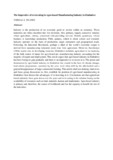Please use this identifier to cite or link to this item:
https://cris.library.msu.ac.zw//handle/11408/1787Full metadata record
| DC Field | Value | Language |
|---|---|---|
| dc.contributor.author | Nyawo, Vongai Z. | - |
| dc.date.accessioned | 2016-09-05T08:59:22Z | - |
| dc.date.available | 2016-09-05T08:59:22Z | - |
| dc.date.issued | 2013-05 | - |
| dc.identifier.issn | 2307-5155X | - |
| dc.identifier.uri | http://hdl.handle.net/11408/1787 | - |
| dc.description.abstract | Industry is the production of an economic good or service within an economy. These industries are often classified into five divisions, first, primary, largely extractive industry where agriculture, tertiary, concerned with providing services. Fourth, quaternary, whose business is knowledge production. Fifth, quinary, which is about culture and research. Industry operates on the basis of production, target consumers and geographical reach. Following the Industrial Revolution, perhaps a third of the world's economic output is derived from manufacturing industries more than from agriculture. However, Sachikonye (1984) asserts that, in developing countries, Zimbabwe included, agriculture is the mainstay of the bulk source of inputs for agro-based and manufacturing industry accounting for the majority of export and employment. This article argues that agro-based industry in Zimbabwe has been losing its grip gradually and there is an imperative to re-invest in it. The power and domination by agro-based industry in Zimbabwe has waned in the face of climate change, land reform programmes, sanctions by the west, rural urban drift by the able-bodied and a general disappearance of large commercial farming. This article shall use desktop, interviews and focus group discussions to, first, establish the position of agro-based manufacturing in Zimbabwe then discuss the advantages of re-investing in it. Conclusions are that agriculture based industries have gone down over the years and re-investing is the solution basing on the availability of resources such as land, minerals, human and implements. Agro-based industry is primary and, therefore, the source of livelihoods and has the capacity to benefit the rest of the industries. | en_US |
| dc.language.iso | en | en_US |
| dc.publisher | Africa Institute for Culture, Peace, Dialogue & Tolerance Studies | en_US |
| dc.relation.ispartofseries | Journal of African Security, Peace and Tolerance Studies;Vol.1, No. 1; p. 56-71 | - |
| dc.subject | Imperative, re-investing, agro-based, manufacturing, industry, economy | en_US |
| dc.title | The imperative of re-investing in Agro-based manufacturing industry in Zimbabwe | en_US |
| dc.type | Article | en_US |
| item.openairetype | Article | - |
| item.languageiso639-1 | en | - |
| item.cerifentitytype | Publications | - |
| item.openairecristype | http://purl.org/coar/resource_type/c_18cf | - |
| item.grantfulltext | open | - |
| item.fulltext | With Fulltext | - |
| Appears in Collections: | Research Papers | |
Files in This Item:
| File | Description | Size | Format | |
|---|---|---|---|---|
| The Imperative of re.pdf | Abstract | 6.17 kB | Adobe PDF |  View/Open |
Page view(s)
126
checked on Jan 24, 2026
Download(s)
14
checked on Jan 24, 2026
Google ScholarTM
Check
Items in MSUIR are protected by copyright, with all rights reserved, unless otherwise indicated.



